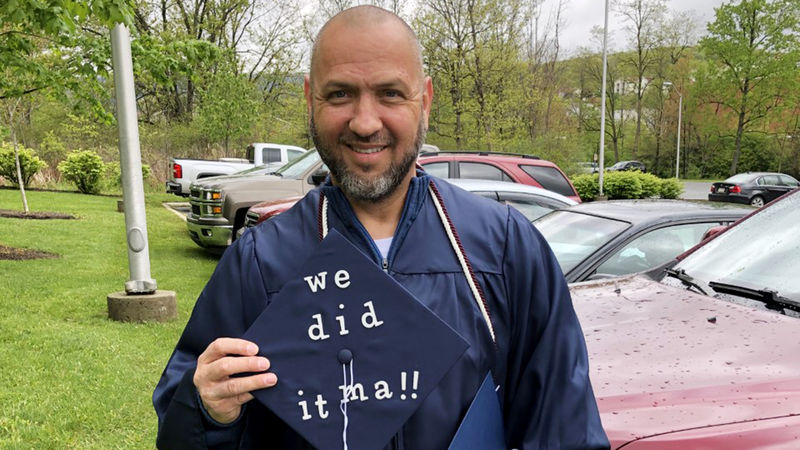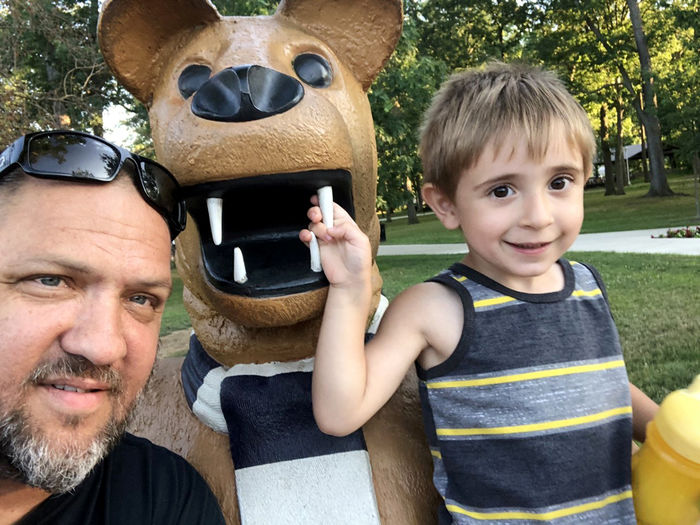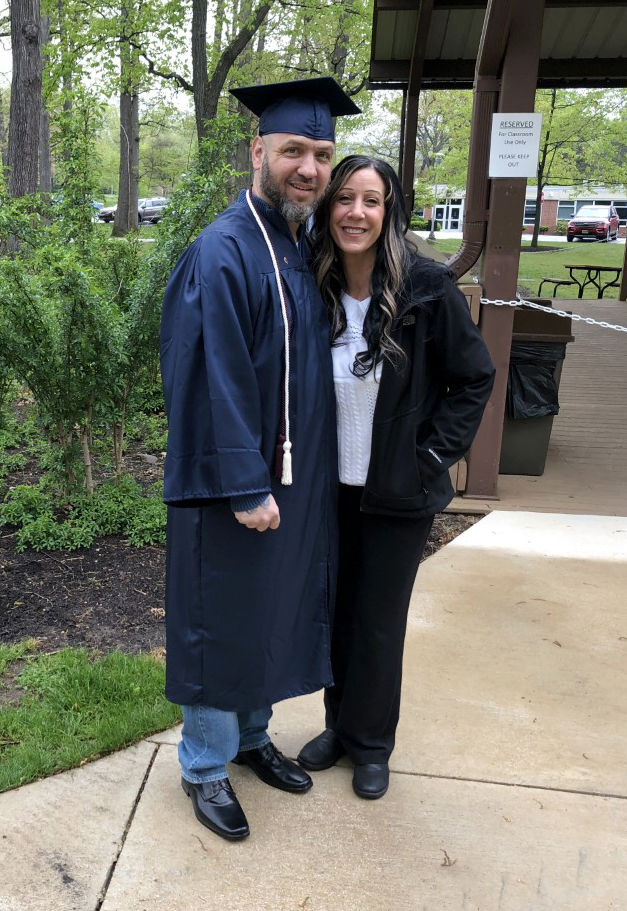

This dialog contains the full navigation menu for this site.

There is something quite powerful about using our own painful experiences and struggles to help others. Showing our most vulnerable, authentic selves can transform, even save, lives.
The Human Development and Family Studies (HDFS) program at Penn State Altoona is a popular choice for students who want to make a career in helping people of all ages overcome life’s challenges. A common route is counseling or social work for drug and alcohol rehabilitation. Over the last five years, upward of ten students have graduated with an HDFS degree as part of their own recovery journey.
This is the second in a three-part series featuring former and current students sharing their personal stories of addiction and rehabilitation.
Steve Farella was at rock bottom again. Heroin addict. Alcoholic. In jail and on the verge of losing rights to his youngest son. He knew he was just about out of chances.
“I was in such a bad place emotionally and physically. I was just so beat up and tired of the emotional anguish. I was ready for a change.” He came to a rehabilitation facility in the Altoona area, hoping it would be the start of his transformation.
After about two months, Farella stepped down in treatment to a halfway house. He stayed there for three months, then moved to a three-quarter house for ten months. Through those long days and weeks, Farella says he finally surrendered to the process of recovery and to recovery itself.
Something he heard over and over during his journey was to create a life he didn’t want to use drugs and alcohol to escape. “I never had a normal family life. I grew up in foster homes and group homes. My whole childhood was nothing but death and moving around and domestic violence and sexual abuse, physical abuse, emotional abuse. I was surrounded by addiction.”
Farella says he truly opened his mind and heart to trusting in his 12-step sponsor. He began to make a real effort to learn the tools of recovery and how to use them. He paid attention to relapse prevention skills and strategies. He started to believe that putting as much effort into living clean as living in addiction could only lead to better living.
Farella also heard over and over that the opposite of addiction isn't recovery. It's connecting with others and putting down new roots somewhere, severed from old people, places, and things. Having built a solid recovery support system in the Altoona area, it made sense for Farella to stay, the best way to remain clean and sober.
Building his new foundation took time and work, dedication, and trust. Each step, each milestone, a block stacked on top of another.
“Slowly, I started gaining things. When I was able to get a vehicle, that was big to me. Being able to pay my bills, that was big to me. Getting married, waking up every day with my son and not being in jail, it’s all amazing. I created this life that I don’t want to escape, just like I was told.”
Amid the hard work of recovery, Farella was encouraged by his program sponsor to enroll in HDFS at Penn State Altoona—the same sponsor who encouraged Kevin Karpovich to enroll.
Farella considered. He’d always been interested in psychology, human development, and social work. A new career would fit well into his new, clean life. But he was nervous. Several times in the past, he’d applied to and was accepted into college, but every time he would use again before classes even began and fall back into active addiction.
However, Farella’s recovery community surrounded him with support and reassurance. “The therapeutic value of one addict helping another is without parallel, and that's what they did for me, not just about using drugs and alcohol, but also showing me that I can go on to be a responsible, productive member of society.”
So, he decided to go for it. “At first, it was challenging. I was 45 years old, sitting in a classroom with these 18, 19, and 20-year-olds. It was intimidating.” But again, Farella’s community stepped up and helped him dismantle the negative beliefs he was experiencing around his age and capabilities.

Steve Farella on campus with his youngest son, Santino.
Lauren Jacobson, assistant teaching professor of HDFS, says Farella was a powerful role model and teacher for younger classmates. “Students were able to see the importance of patience and being nonjudgmental in their work with people in need. He helped them realize that addiction isn’t just about making bad choices and having the willpower to stop using drugs but a symptom of poor mental health, lack of social and emotional support, limited opportunities for education or employment, and ineffective coping skills. He showed them the importance of listening to someone’s story with compassion and an open mind.”
Of course, it wasn’t an easy road for Farella. It was a lot of hard work, a lot of studying, and a lot of time away from home, which put a strain on his recent marriage and relationships with his newborn son, along with his eight other children. Yet he chose to press on.
“I felt like I never lived up to my potential in high school, so I wanted to do my best. When I did well, it helped my self-esteem and self-acceptance. The old line that ‘once an addict, always an addict’ is dead. We can and do recover.”

Steve Farella with his wife Christi on graduation day in spring 2021
Farella graduated in 2021 with a 3.6 grade point average and earned Penn State Altoona’s 2020-21 Non-Traditional Student Recognition Award. He now works as a counselor for a local drug and alcohol facility with the man who he says believed in him and loved him until he learned to love himself. He is also working toward earning his master’s degree at Pennsylvania Western University Edinboro campus. He thinks one day he’d like to open his own facility and work with veterans suffering from a post-traumatic stress disorder and substance use disorder.
“I deeply value the opportunity I had to work with Steve. He is a gentle soul,” states Jacobson. “His story informed and expanded my own comprehensive understanding of the forces steering someone to addiction and the obstacles inhibiting their successful recovery. I am grateful for his ability to help me stay connected to my own sense of compassion, and serving as an example of the ways education can be a transformative experience for students and faculty can be a pivotal touchpoint in that process. I’m excited to have a front-row seat to his flourishing personal, interpersonal, and professional life.”
Looking back, Farella absolutely believes making connections, and building relationships made all the difference in his recovery.
“Taking down my walls and letting others in has been huge. From my team members to others going through rehab to my professors and classmates, having people who cared and wanted me to succeed was profound. Now I try to be that person for others through counseling or sponsoring. That's how the program works; that’s how recovery works.”


